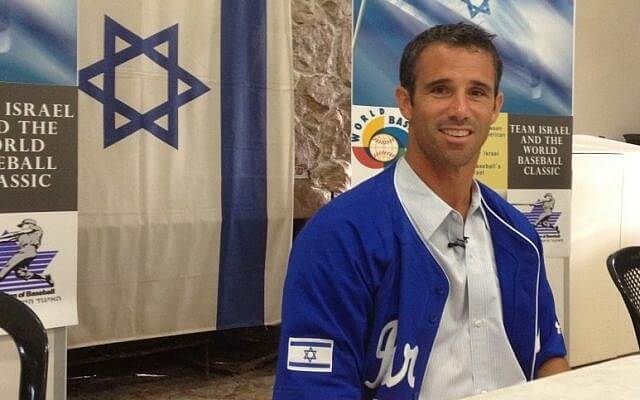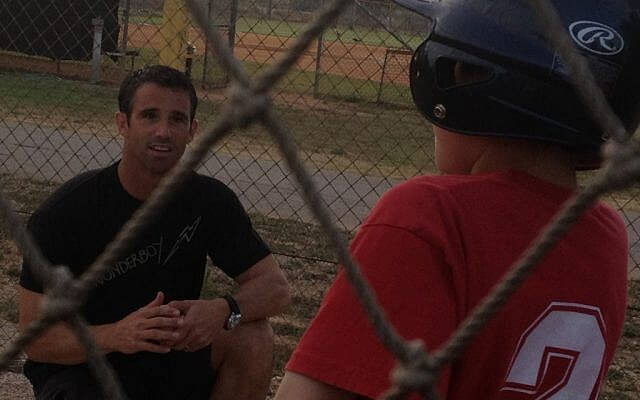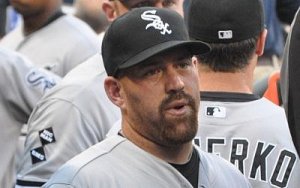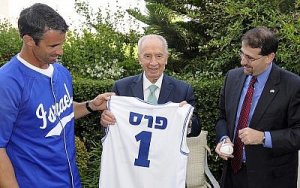Major League Baseball veteran’s gig as coach in the Holy Land last year is one of the more important lines on his resume
BALTIMORE – Almost from the moment they met him, several officials and players with Israel’s national baseball team said they saw manager Brad Ausmus headed for the major leagues.
They cited his communication skills, command of the game and preparation — not to mention his 18-year playing career as a catcher that included winning three Gold Gloves and reaching the 2005 World Series with the Houston Astros.
“We knew that even though he’d never had any managerial experience, he’d go and be a major league manager,” said Nate Fish, the bullpen catcher for an Israeli squad that came up short in its bid for the World Baseball Classic. “The overall chemistry was at a very, very high level, and Brad was very professional. He created a very good environment in the clubhouse.”
Fish and the others proved prophetic: Ausmus, 44, was introduced Sunday as the manager of the Detroit Tigers, succeeding Jim Leyland.
“I’m very excited about the opportunity to manage the Tigers. This is a very good team, and new managers rarely are handed the reins,” said Ausmus this week to the Times of Israel.
Ausmus joins a short roster of Jews who have managed major league teams, which includes current Oakland Athletics manager Bob Melvin — both have Jewish mothers and non-Jewish fathers. The first was one of the earliest Jewish players, Lipman Pike, an outfielder-infielder who managed the Cincinnati Red Stockings in 1877.
In the WBC qualifiers, Israel won its first two games before being eliminated by Spain in a 10-inning loss.

“Brad did a great job of managing the entire tournament, especially the [elimination] loss, which he handled with dignity and class,” said Gabe Kapler, who coached for Team Israel alongside Ausmus, his former Tigers teammate, and now is a Tampa Bay Rays consultant.
His age and long playing career helped Ausmus earn respect from the Team Israel players, officials and players said.
Ausmus was so refined in his attention to detail, said Peter Kurz, president of the Israel Association of Baseball, that the team practiced keeping on its caps for the playing of “Hatikvah,’ the Israeli national anthem, following Israeli custom.
In assembling the club, Ausmus compiled information on prospective players on his iPad and index cards. His recruiting effort also included calls to scores of candidates, as well as their parents.
His work not only before but during the WBC qualifying “made our team legitimate,” Kurz said. The experience apparently assured Ausmus that his post-playing career inclination was accurate.
“He told me he felt that he was not just the manager, but the general manager — that it was a lot of fun choosing his own players. It gave him the feeling he could do it,” Kurz said.
Though there has been some talk in the media about Ausmus’s lack of experience, the veteran catcher disagrees.

Former All-Star catcher Brad Ausmus gives some pointers to a young Israeli baseball enthusiast (photo credit: Michal Shmulovich)
“There’s many levels of qualification to manage a MLB team. I suppose we will find out a year from now if I was qualified or not. In the meantime I have a veteran bench and pitching coach standing beside me in the dugout that I can lean on if necessary,” Ausmus told the Times of Israel this week.
Last year, prior to taking on Israeli baseball, Ausmus had said, “I have experience coaching on the field at both the major and minor league level, and I have done front office work. To be a manager is not a huge shift.”
Ausmus is replacing a successful manager in Leyland, who at 68 was the oldest skipper in baseball. Leyland guided the Tigers to two American League championships in his eight seasons. In 1997, he had managed the Florida Marlins to the World Series crown.
Several members of Leyland’s staff will be staying on with Ausmus, including bench coach Gene Lamont. With Team Israel, Ausmus leaned on Kapler and Shawn Green, both former major league outfielders. It was an arrangement that developed unusually.
At a November 2011 meeting in Cypress, Calif., Kapler peppered team officials with questions, while Green and Ausmus “were very quiet,” Kurz recalled. The three ex-players were offered playing and field leadership roles and asked to select their preferred jobs.
“I thought for sure Gabe would be the manager because he’d managed one year in the minors,” Kurz said.
In a February 2012 conference call, the trio revealed to Israeli baseball officials their division of labor: Ausmus, manager; Green and Kapler, player-coaches.
“From then on, Brad came into his own” on the job, Kurz said.
That May, Ausmus and his wife, Liz, visited Israel, where the new manager ran baseball clinics for children, held a news conference, donned tefillin for the first time and went surfing in Tel Aviv.

Brad Ausmus, President Shimon Peres and US Ambassador Dan Shapiro. (photo credit: courtesy of US Embassy)
Ausmus took great pride in meeting Israeli President Shimon Peres, said the U.S. ambassador to Israel, Dan Shapiro, who accompanied Ausmus to the meeting.
“Peres is an impressive man. I get the feeling he could slide in to any situation with people of any background and make them feel comfortable,” Ausmus told the Times of Israel last year.
“The opportunity to lead the team struck him as fun and also novel,” Shapiro said of his conversation with Ausmus, who wracked up 1,579 hits — fifth among Jewish players — while playing for four teams in the majors.
Ausmus has stayed in touch with his Team Israel players. He helped pitcher Alon Leichman deal with some mound struggles at California’s Cypress College and wrote letters of recommendation on his behalf when Leichman was transferring to the University of California, San Diego.
“It meant so much that … he really helped me,” said Leichman, one of three Israel-born players on the team – he was raised on Kibbutz Gezer – and now a pitcher at UCSD. “He owed me nothing, so I’m really humbled by it.”
One player on the Israeli team might even rejoin Ausmus in Detroit: Ben Guez, an outfielder for the Tigers’ AAA Toledo club. Three Team Israel members played in the major leagues in 2013: Nate Freiman of the Athletics, the Astros’ Josh Zeid and Josh Satin of the New York Mets.
Leichman already was a Detroit fan because his mother, Rabbi Miri Gold, is a native. But with Ausmus as the Tigers manager, “I’m rooting for them even more,” he said. “Every baseball fan in Israel is now a Tigers fan.”
(Source: http://www.timesofisrael.com)





